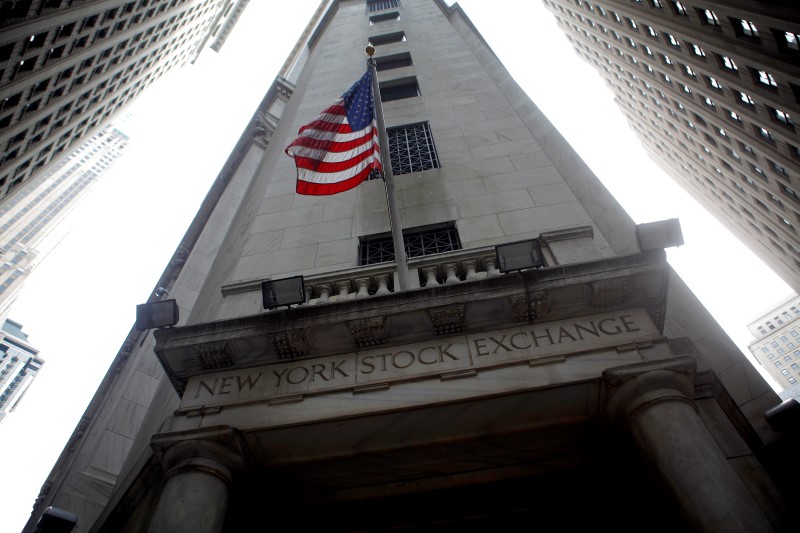Investing.com -- The Dow wrapped up a strong November, with swashbuckling gains on Thursday as investors cheered further a slowdown in inflation and mostly better than expected corporate earnings.
By 16:00 ET (21:00 GMT), the Dow Jones Industrial Average rose 520 points, or 1.5%, the S&P 500 rose 0.4%, while the NASDAQ Composite fell 0.2%.
The blue-chip Dow Jones Industrial Average rose 8% in November, its best month since October last year. The broad-based S&P 500 was up nearly 9% in November, while the tech-heavy Nasdaq jumped 10.7%, with both indexes delivering their best monthly performances since July 2022.
Inflation continues to slow, but Treasury yields climb
The October personal consumption expenditures price index, the Fed's preferred measure of inflation, slowed to a 0% pace, compared with forecasts for a 0.1%, from a 0.4% last month, taking the annualized figure to 3.4%, down from 3.7% the prior month.
Core PCE inflation, which the Fed believes is a more accurate gauge of underlying inflation slowed to a 3.5% pace from 3.7% the prior month.
The slowing pace of inflation comes even as the labor market appears strong than expected as initial jobless claims climbed by less than expected.
Treasury yields shrugged of the signs of slowing inflation, with the yield on the 10-year Treasury up 7.1 basis points to 4.339%.
Salesforce shines on earnings stage
Salesforce Inc (NYSE:CRM) jumped more than 9% after the company lifted its annual guidance following Q3 results that topped Wall Street estimates as ongoing efforts to cut costs boosted margins.
Salesforce will likely continue to expand margin, Goldman Sachs, "albeit at a more moderate rate, when a macro recovery starts to form."
Ford lowers annual guidance amid labor strike impact
After withdrawing guidance in October owing to uncertainty over costs relating labor strikes, Ford Motor Company (NYSE:F) reinitiated its guidance for 2023, now expecting to deliver an operating profit between $10 billion and $10.5 billion. But that was lower than prior guidance delivered in July for operating profit between $11B and 12B.
The guidance included the $1.7B hit following production disruptions owing to United Auto Workers labor strikes. The costs associated with the new U.S labor agreement with UAW is expected to cost $8.8B.
Fed speak continues ahead of Powell speech
Fed New York President Williams said Thursday that the Fed's rate-hike cycle has likely come to end, though warned that if disinflation doesn't continue, then the central bank could resume hikes.
"Based on what I know now, my assessment is that we are at, or near, the peak level of the target range of the federal funds rate," Williams said, though added that "if price pressures and imbalances persist more than I expect, additional policy firming may be needed."
The remarks come ahead of a speech by Fed chairman Jerome Powell on Friday. The Fed chief is expected to deliver remarks at a fireside chat with Spelman College President Helene Gayle at 11:00ET.
Tesla starts deliveries of Cybertruck; Microsoft linked with OpenAI board
Tesla Inc (NASDAQ:TSLA) started deliveries of its Cybertruck electric pickup on Thursday, with a starting price of $60,990 as CEO Elon Musk bets big on electric truck segment.
That was well above the $40,000 price tag Musk first touted for the base model in 2019.
Additionally, Microsoft (NASDAQ:MSFT) will take a spot on OpenAI's board of directors, according to returning Chief Executive Officer Sam Altman.
Oil falls as OPEC+ cut plans fail to inspire bulls
Oil prices fell in volatile trade Thursday after OPEC+ members agreed to make additional voluntary production cuts that fell short of expectations.
Excluding Saudi and Russian production cuts, OPEC+ members plan to make additional voluntary production cuts, totalling about 684,000 barrels per day, which fell short of expectations for cuts of about 1 million barrels.
In an unusual move that points to signs of potential divisions in the group, the plans for voluntary cuts were announced by individual OPEC+ members that than the secretariat.
Saudi Arabia pledged to extend its voluntary cut of 1 million barrels per day until the end of Q1, while Russia said it would deepen its crude export curbs to 500,000 bpd from 300,000 bpd previously.
(Peter Nurse and Oliver Gray contributed to this report.)
